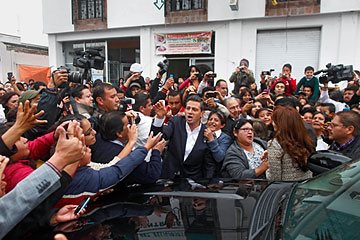
Pena Nieto is mobbed by supporters after casting his vote during the presidential election in July
(3 of 3)
Then there's the question of what Mexico should do about marijuana if more U.S. states light up legalization measures. "It doesn't necessarily mean [Mexico] is suddenly going to change what it's doing now," Peña Nieto tells TIME. "But I am in favor of a hemispheric debate on the matter." For example: Would legalization, since marijuana accounts for at least a third of the estimated $30 billion Mexico's drug traffickers rake in each year, help sap the cartels' coffers? And even if U.S. federal law doesn't change, is it worth putting Latin American cops' lives at risk chasing the drug if U.S. states are legalizing it? "This is a great opportunity for [Peña Nieto] to show leadership," says Jorge Hernández, head of the Collective for an Integral Drug Policy in Mexico City, which wants Peña Nieto to back pot legalization in Mexico.
Doing Battle with Monopolies
But Peña Nieto acknowledges that public security is just as undermined by the unacceptable "socioeconomic contrasts that persist in this country." Mexico's middle class is expanding, with 17% of the population joining that rank in the 2000s, and the nation's doing a lot of things right to lure investment. But its 45% poverty rate is still one of the drug cartels' best recruiting tools, as is the fact that it is harder for the average Mexican to access bank credit and other financial services than almost anywhere else in the world. One result: an anemic 2% average economic growth rate since 2000, half what Brazil has had. "The definition of middle class is exaggerated here," says Efraín Sánchez, 35, a recently married Puerto Vallarta construction worker struggling to make ends meet. If Peña Nieto wants to transform the "ineffective state" he deplored in his 2010 book, Mexico: The Great Hope, "he'll have to challenge the economic status quo, not just in Mexico but in his own party," says García.
The new labor law, a compromise measure that makes it easier for small and medium-size businesses to hire and fire — and which compels more transparency from unions, long a bastion of PRI support — is a positive early step. So are Peña Nieto's proposals to overhaul the revenue code — Mexico's tax collection amounts to less than a fifth of its gross domestic product, the lowest among the 34 large economies in the Paris-based Organisation for Economic Co-operation and Development. He's also creating an autonomous commission to combat, as he tells TIME, "the social cancer of corruption" that costs Mexico almost a tenth of GDP each year, according to the World Bank.
Just as important is the plan to channel private capital into state-owned Petróleos Mexicanos (Pemex), the $125 billion oil giant whose production is declining at an alarming rate. "Private participation [in Pemex] is a sensitive national issue for Mexicans," says Peña Nieto, "but we have to expand [Pemex's] capacity and infrastructure." Brazil's booming, state-owned Petrobras, he admits, "offers a good example" of the kind of broader investment Pemex has to welcome if it wants to stay globally competitive.
Yet none of those reforms may matter as much as the battle against Mexican monopolies. From tortillas to telecom, they control market shares as high as 95%, and many of their tycoon owners — including Carlos Slim, the world's richest man — owe their billions in no small part to their past ties to the PRI. That makes it all the more incumbent on Peña Nieto — who is often accused of his own cozy relationship with the nation's dominant television network, Televisa — to crusade for competition. Economists project that developing countries can add about a point of economic growth for every 100 small and medium-size businesses that become large companies — a reality that Brazil has embraced, and Mexico hasn't. Peña Nieto says he's ready to submit trust-busting legislation that would include vital legal-appeals reform, "to prevent monopolies from being able to resort to the constant, endless litigation they use to avoid paying fines and sanctions."
Peña Nieto has a full agenda as he assumes power, and it's all the more challenging given that he won only 38% of the vote in July, while the PRI fell well short of the congressional majorities it had expected. "That was a healthy sign for our new democracy," says García. "It said Mexicans want to give the PRI the benefit of the doubt, but they don't want to give it a long leash." Peña Nieto's challenges won't end at Mexico's borders — his other major goal is to regain the Latin American leadership role Mexico had enjoyed before the chaos of the drug war engulfed the country. "When we improve our social and economic development at home," he says, "I know we'll project ourselves more strongly outside Mexico again." While that might not put his country any closer to God or farther from the United States, at least it would help Mexico catch up with the likes of Brazil.
—with reporting by Ioan Grillo / Mexico City
